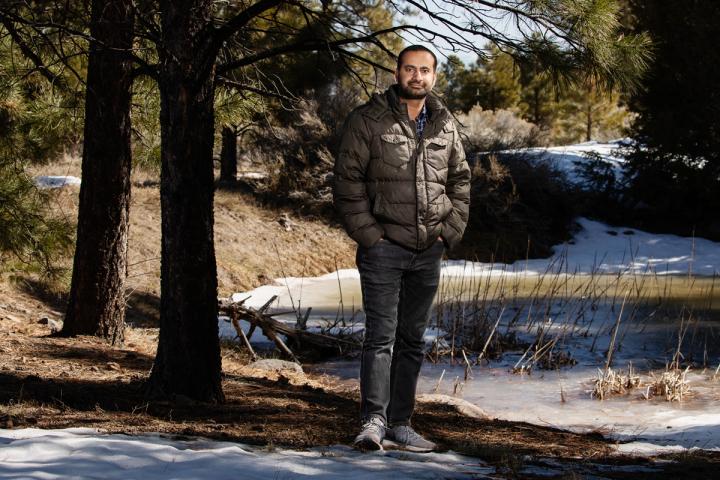
Credit: Photo courtesy Los Alamos National Laboratory
CHAMPAIGN, Ill. — Bacteria in the human body are sharing genes with one another at a higher rate than is typically seen in nature, and some of those genes appear to be traveling – independent of their microbial hosts – from one part of the body to another, researchers report in the journal Scientific Reports.
The findings are the result of a molecular data-mining method initially conceptualized by Kyung Mo Kim, a senior research scientist at the Korea Polar Research Institute. University of Illinois crop sciences and Carl R. Woese Institute for Genomic Biology professor Gustavo Caetano-Anollés developed the approach with his former student Arshan Nasir, of COMSATS University Islamabad, Pakistan, who is currently a Distinguished Fellow at the Los Alamos National Laboratory in New Mexico.
This computationally challenging method allowed them to identify instances of “horizontal gene transfer,” the direct transfer of genes between organisms outside of sexual or asexual reproduction.
“Horizontal gene transfer is a major force of exchange of genetic information on Earth,” Caetano-Anollés said. “These exchanges allow microorganisms to adapt and thrive, but they are likely also important for human health. There are some bacteria that cannot live outside our bodies and some without which we cannot live.”
“A better understanding of this phenomenon also will have significant public health value, since the emergence of multidrug-resistant pathogens as a result of the horizontal spread of antiobiotic-resistant genes has become a global concern,” Nasir said.
For the new analysis, the scientists used genomic information to build tens of thousands of “family trees” of bacteria that colonize the human body. Reconciling those with trees of microbial genes allowed the team to tease out which genes had been inherited and which were the result of horizontal gene transfer.
“Most current methods for determining horizontal gene transfer compare DNA features or statistical similarity between genomes to identify foreign genes,” Nasir said. “This works fairly well for relatively recent gene transfers, but often fails to identify transfer events that occurred millions or billions of years ago.”
The more labor-intensive approach enabled the team to surmount this barrier, he said.
“We studied human-associated microorganisms, since they are known to be key players in maintaining human health and metabolism,” Nasir said. “We calculated gene-transfer rates and direction – who transferred what to whom – for more than 1,000 reference bacterial genomes sampled by the National Institutes of Health Human Microbiome Project.”
The bacteria had been sampled from six human body sites: the gut, skin, oral cavity, blood, urogenital tract and airways.
The researchers found evidence to support earlier findings that human-associated bacteria are quite promiscuous with their genes, Caetano-Anollés said.
“The horizontal exchange between microbes in our bodies is about 30 percent higher than what you’ll find on the rest of the planet,” he said. “This implies that our bodies provide a niche that is unique and facilitates innovation at the microbe level.”
About 40 percent of gene swapping occurred among bacteria living in the same body sites. The other 60 percent involved gene sharing among bacteria in different tissues, for example between organisms in the gut and in blood.
In all cases, gene transfer was most common among closely related organisms, regardless of whether they occupied the same or different bodily tissues. In fact, the researchers report, gene sharing among organisms in different body sites occurred at a higher rate than gene sharing among distantly related bacteria living at the same sites.
“Some of these could be very old gene transfer events that happened before the microbes colonized the human body,” Nasir said. “It also could be that some bacteria colonize different human body sites at different time points in an individual’s lifespan. The others could be the result of the transfer of bacterial DNA from one site to another, perhaps through the blood. We need further experimental evidence to test this tantalizing possibility.”
The researchers say other scientists can use the tool they developed for this work, HGTree, to more accurately predict which genes were inherited “vertically,” through the process of reproduction, and which were picked up from other microbes through horizontal gene transfer. This will lead to an improved understanding of microbial – and human – evolution, the researchers said.
###
Former graduate students Hyeonsoo Jeong and Bushra Arif contributed to this research.
The National Science Foundation supported the international collaboration that made this work possible.
Editor’s notes:
To reach Gustavo Caetano-Anollés, call 217-333-8172; email [email protected].
To reach Arshan Nasir, call 505-606-0138; email [email protected].
To reach Kyung Mo Kim, call +82-10-5022-8992; email: [email protected].
The paper “Horizontal gene transfer in human-associated microorganisms inferred by phylogenetic reconstruction and reconciliation” is available to members of the media from the U. of I. News Bureau
Media Contact
Diana Yates
[email protected]
Related Journal Article
http://dx.




